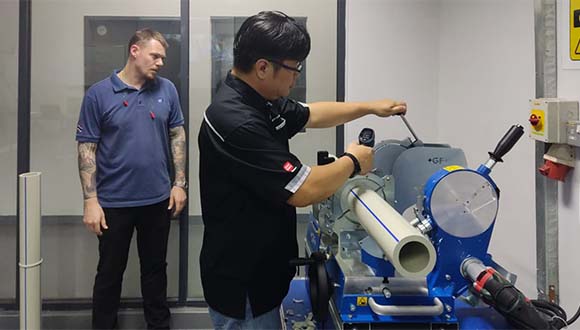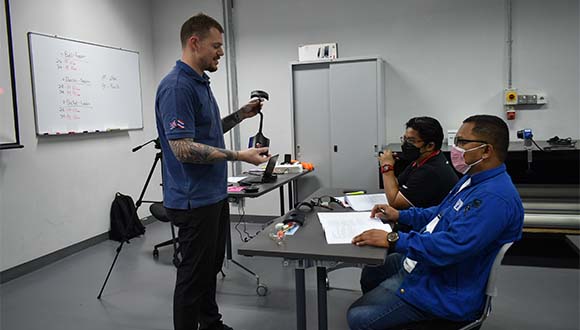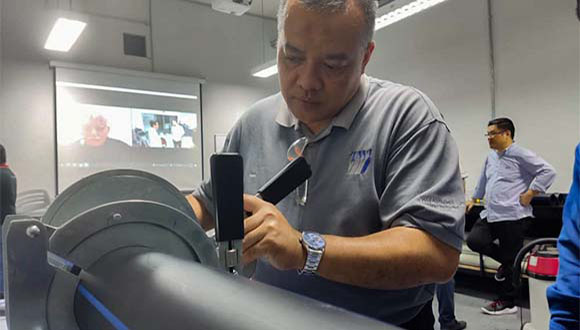Fri, 05 November, 2021
What is the name of this programme and why is it developed?
The name of this programme is CSWIP Plastic Welder. It’s been available in the TWI UK for several years, and we have recently brought this programme to Southeast Asia. It was officially launched on the 25th of October at our training centre in Malaysia.
As the institute of welding and joining of materials, we believe it is necessary to ensure that the welds being conducted on plastic pipes are fit for purpose. Not only from the welding side, but we also want to ensure that the people performing the welds and making the joints are competent, and we also need to ensure that we have inspectors ready to inspect those joints.
The reason why the programme is brought to Malaysia is that we’ve seen a massive transition within many industries and sectors that are shifting from metal pipes to plastic pipes across S.E.Asia, with the Philippines, Brunei, Vietnam, Thailand, Australia, and Malaysia being great examples. Therefore, we found its paramount importance to adapt to the evolving changes in the industries and prepare our institute with the essential programmes.
What are the certification details and how does it work?
The CSWIP certification body has endorsed the training, and they will be certifying the candidates that successfully pass the examination. There is a theoretical examination to the course and a practical assessment.
The initial approval is valid for two years, with a prolongation of the certificate for another two years. By the end of the fourth year, candidates need to do an assessment to renew their Certification. However, candidates are also required to validate their certificate once a year by submitting a verification letter to CSWIP. This is to confirm that candidate is still working in the same field and is maintaining the skillsets.

Where in the world are the CSWIP Plastic welding and inspection training available?
Currently, the training is only available in the UK in Cambridge, Middleborough, and Kuala Lumpur (Malaysia). However, we will be trying to introduce the qualification to other countries as well.
Speaking about the programme as a whole, what are the different courses that fall under this category?
At the moment, we have launched the CSWIP plastic welder (entry-level 2) since the demand in the Southeast Asian market is for plastic pipes. However, at a later date, we will be looking at hot gas welding, which would be secondary to pipes welding (in terms of popularity), and geomembrane welding, which is the joining of massive sheets of plastics.

Why would anyone need to attend this training and get certified on this skill?
The course and examination material prepared for the plastic programmes are very comprehensive. Some individuals may already have some basic knowledge of plastics and associated welding processes. However, undertaking the approved training programme would enable a better understanding of why they are performing those tasks in specific ways and the theories behind the practices. Passing the assessments and being awarded the Certification would deem you competent and qualified in the industry, ensuring all welding is performed correctly and the joints are free from imperfections, enabling a safer work environment, better quality control, and enhanced cost-efficiency.
What are the entry requirements and who should consider attending this training?
For entry to level 2, it is recommended to have some experience. However, there are no compulsory pre-requisites for the examination.
In other words, anybody who wants to get into the industry of plastic welding or plastic joining can come on this course and use it as a stepping stone for their career progression. The plastic welding level 1 (standard level) does, however, have a pre-requisite, which is two years of relevant working experience in plastic welding.
Is it worth considering Plastic Welding as a qualification for becoming a multi-discipline inspector?
This can very much depend on where one works, however, to increase your employability benefits, it is always better to be multi-discipline or multi-skilled in your line of expertise. As a metal welder, if one can perform different welding techniques and positions, they would have an obvious advantage over those who have a limited skill range. The same can apply to plastic welding.
